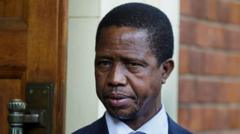The death of former Zambian President Edgar Lungu has ignited a fierce and undignified controversy over the handling of his remains. The 68-year-old leader passed away two months ago while receiving treatment in South Africa, leaving behind a complicated legacy marked by a contentious political climate in Zambia. Recently, a court in Pretoria has ruled in favor of the Zambian government, enabling the repatriation of Lungu's body and the arrangement of a state funeral, a decision met with resistance from the late president's family.
The ruling has resulted in celebrations among some members of the ruling party, who famously echoed English football fans with the phrase, "It's coming home," as a symbol of victory over the family’s wishes. However, beneath this surface celebration lies a more profound division in Zambian society, as many citizens express frustration over the ongoing battle while the country grapples with pressing economic issues.
Underlying this conflict are deep-rooted political animosities between Lungu and his successor, Hakainde Hichilema, who defeated Lungu in the 2021 elections. Tensions have been exacerbated by allegations of persecution levied by Lungu's family against Hichilema, with accusations ranging from wrongful imprisonment of the current president during his opposition years to the ongoing legal troubles facing the former first family.
In the courtroom drama, the emotional outburst from Lungu’s sister, Bertha, illustrated the pain engulfing the family, as she vehemently protested the government's actions while lamenting the loss of her brother. Complications have arisen from a prior agreement stating that Lungu's body would be returned for a state funeral, which has since faltered due to disagreements over Hichilema’s involvement in the proceedings—allegedly counter to Lungu's last wishes.
The legal battle over the remains continues as the family seeks to assert its right to dictate the terms of Lungu's burial, even appealing the South African court ruling. This legal back-and-forth not only highlights the family's desire for a dignified farewell for Lungu but also reflects broader societal rifts influenced by historical grievances and ongoing political rivalry.
Zambian historians and political analysts emphasize that the government's insistence on a state funeral without family participation may backfire, further polarizing an already divided nation and fueling rumors and beliefs linked to witchcraft, which remain prevalent in the region. While some political allies of Hichilema defend his approach to the situation, asserting it is borne of duty rather than personal ambition, public opinion remains split.
As the drama unfolds, many Zambians are left wondering who truly holds the agency in such a sensitive time. The debate is emblematic not just of a family's grief but of a national struggle to reconcile its past with the current political landscape, and whether Lungu’s body will "come home" remains heavily contested.
The ruling has resulted in celebrations among some members of the ruling party, who famously echoed English football fans with the phrase, "It's coming home," as a symbol of victory over the family’s wishes. However, beneath this surface celebration lies a more profound division in Zambian society, as many citizens express frustration over the ongoing battle while the country grapples with pressing economic issues.
Underlying this conflict are deep-rooted political animosities between Lungu and his successor, Hakainde Hichilema, who defeated Lungu in the 2021 elections. Tensions have been exacerbated by allegations of persecution levied by Lungu's family against Hichilema, with accusations ranging from wrongful imprisonment of the current president during his opposition years to the ongoing legal troubles facing the former first family.
In the courtroom drama, the emotional outburst from Lungu’s sister, Bertha, illustrated the pain engulfing the family, as she vehemently protested the government's actions while lamenting the loss of her brother. Complications have arisen from a prior agreement stating that Lungu's body would be returned for a state funeral, which has since faltered due to disagreements over Hichilema’s involvement in the proceedings—allegedly counter to Lungu's last wishes.
The legal battle over the remains continues as the family seeks to assert its right to dictate the terms of Lungu's burial, even appealing the South African court ruling. This legal back-and-forth not only highlights the family's desire for a dignified farewell for Lungu but also reflects broader societal rifts influenced by historical grievances and ongoing political rivalry.
Zambian historians and political analysts emphasize that the government's insistence on a state funeral without family participation may backfire, further polarizing an already divided nation and fueling rumors and beliefs linked to witchcraft, which remain prevalent in the region. While some political allies of Hichilema defend his approach to the situation, asserting it is borne of duty rather than personal ambition, public opinion remains split.
As the drama unfolds, many Zambians are left wondering who truly holds the agency in such a sensitive time. The debate is emblematic not just of a family's grief but of a national struggle to reconcile its past with the current political landscape, and whether Lungu’s body will "come home" remains heavily contested.


















